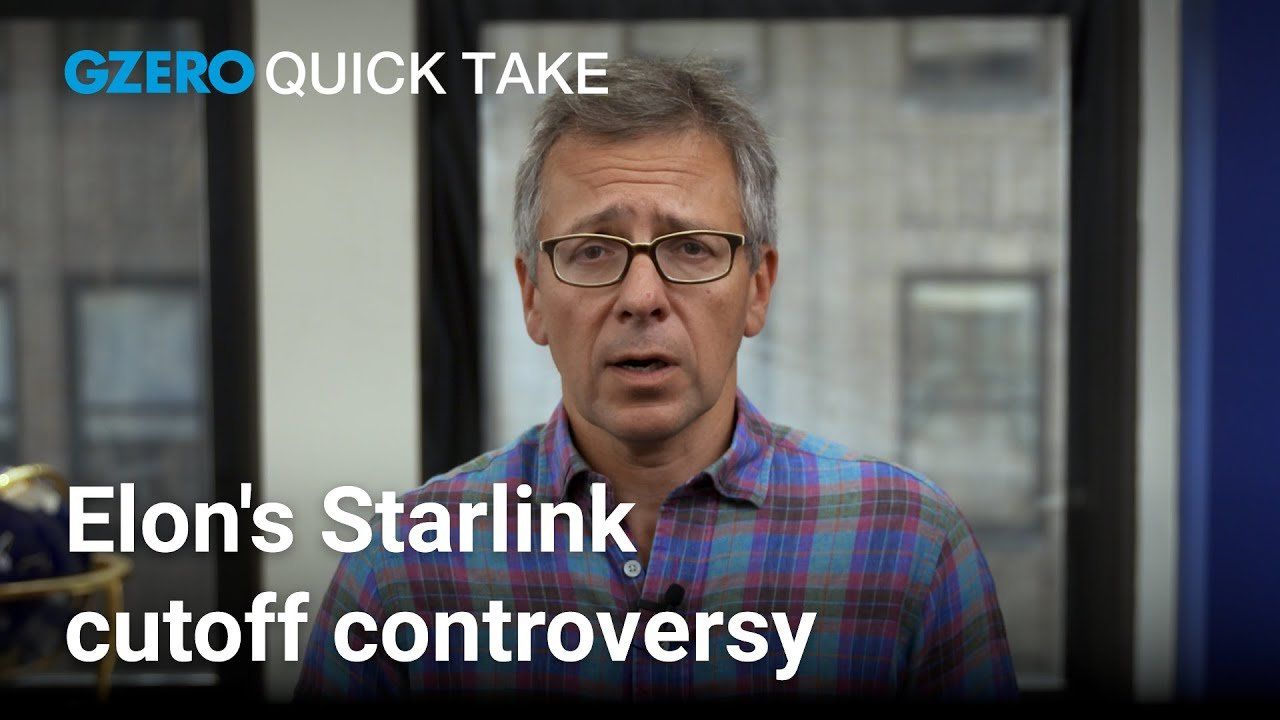
I think it's a fascinating question. And it gets to a point of what I call a technopolar world, not unipolar, not bipolar, not multipolar, technopolar. In other words, for all of our lives, we've talked about a world where nation states, where governments are the principal actors with sovereignty over outcomes that matter critically for national security. Now, here you have the Russians invading Ukraine. One of the biggest challenges to the geopolitical order since the Soviet Union collapsed in 1991. And yet, a core decision about whether or not Ukraine will be able to defend itself is being made not by the United States or NATO providing the military support, but by a technology company. Now, the Ukrainian government is being quite critical of some of the decisions that Elon Musk has made in restricting the use for Starlink, for the Ukrainians.
I don't think that's fair criticism by itself. I think we need to recognize that Starlink's availability to the Ukrainians was absolutely essential in helping the government and the military leaders actually communicate with their soldiers on the front lines. And if it wasn't for Starlink, and if it wasn't for the role of many other technology companies, largely in the United States, not at all clear to me that Zelensky would still be in power today. Certainly the Ukrainians would have lost a lot more territory and they'd be in much worse position than they are. So I think that the Ukrainians still owe Elon a significant debt. But I also raise a much bigger question, which is, should an individual CEO, should an individual centibillionaire be making these decisions about outcomes of life and death for 44 million Ukrainians?
And they're the answer is much more concerning. Because, of course, Elon and all of these technology companies, they're not treaty signatories with NATO. They don't have any obligation to do anything other than Netflix and chill. And yet they're absolutely indispensable for national security in these countries as increasingly national security becomes a matter of not just what happens with bombs and rockets, but also what happens in the digital world, what happens in cyberspace, what happens in communications, in the collection of intelligence. As Elon and others become principal actors in a military industrial technological complex, accountability for those decisions is very deeply concerning if it's only in the hands of those individuals. Now, I think it's a little easier with SpaceX, because SpaceX is, after all, a company that is overwhelmingly funded by the US government, by the Pentagon and by NASA. And so ultimately, either legally through regulation or informally through pressure on the basis of providing those contracts, there is certainly a level of influence that the US government would be able to have over a SpaceX to ensure that Starlink is made available fully to the Ukrainians as US. and NATO's allies see fit.
Just as the American government would take vigorous exception if SpaceX and Starlink were suddenly having their technologies made available to American adversaries. Having said that, keep in mind that there is no other viable technology that is presently available. So, if it's not Starlink, it's nothing for the Ukrainians. And what about a country like Taiwan? Very concerned increasingly that we see the status quo on Taiwan eroding from the United States, as Biden says that he would defend Taiwan and as the Americans put export controls on TSMC, the semiconductor company, and from the Chinese side, as the Chinese keep sending over drones and aircraft to invade Taiwanese airspace. Well, if there were cyber attacks from mainland China into Taiwan, would Starlink be made available in Taiwan the way it has been in Ukraine, even though imperfectly in Ukraine? And the answer to that, I suspect, would be absolutely not, because it would prevent Elon Musk from doing effective business in mainland China, including Tesla. Would the Chinese use that leverage against Elon in a way that the American government had not been against SpaceX?
Absolutely they would. And so what does that mean? Does it mean that that just means Taiwan doesn't get that ability to defend itself? Or does the US government have to somehow, through force majeure, nationalize the technology and take it away from SpaceX or force SpaceX to provide Starlink to Taiwan? Or does the US government have to build its own alternative, where it has direct ownership of such a company and technology. Look, the fact is this is a very, very messy piece of geopolitical power where increasingly technology companies are acting as sovereigns. And until and unless those questions are answered, we are increasingly living in a technopolar world.
That's it for me. And I'll talk to you all real soon.